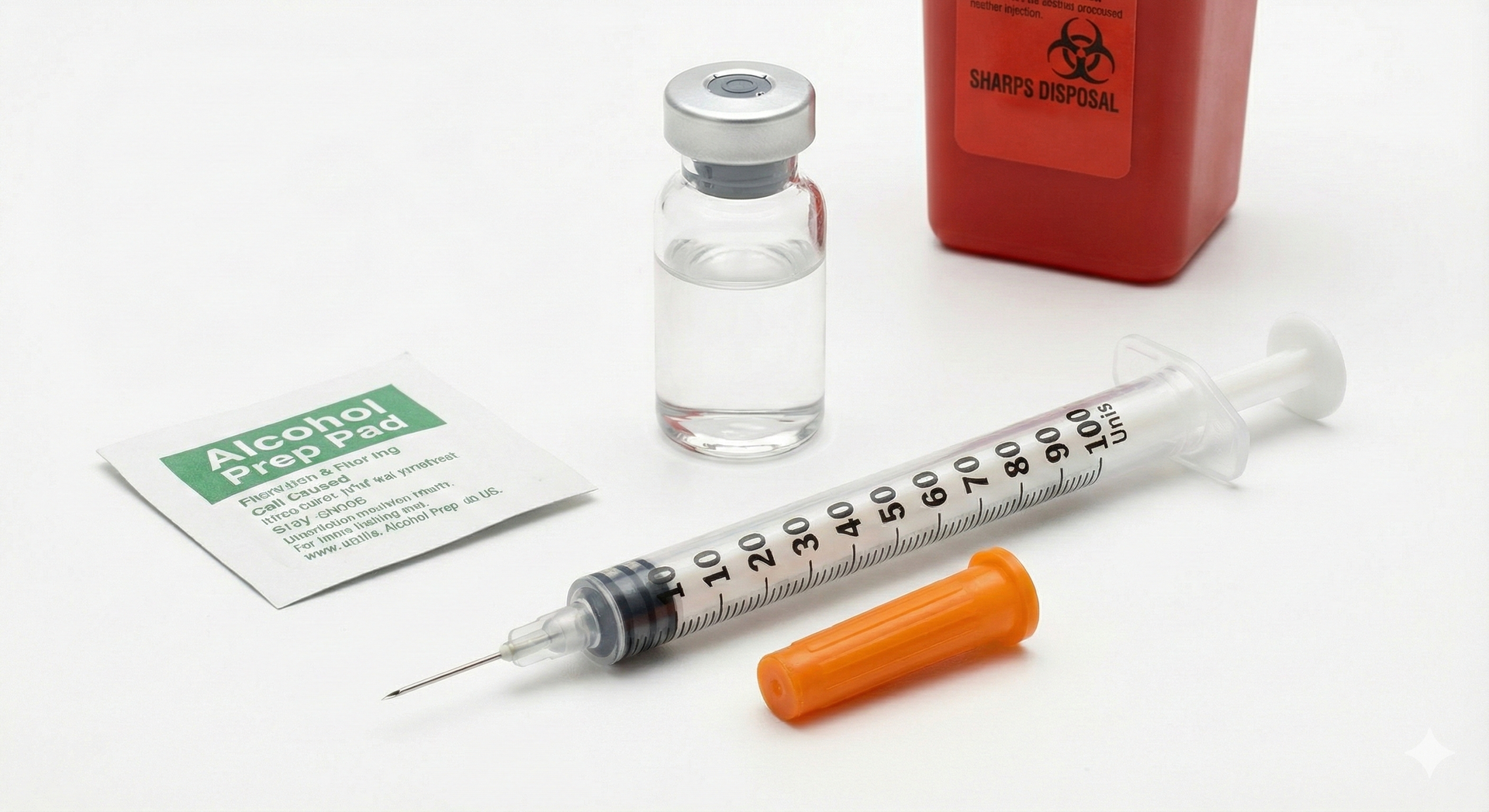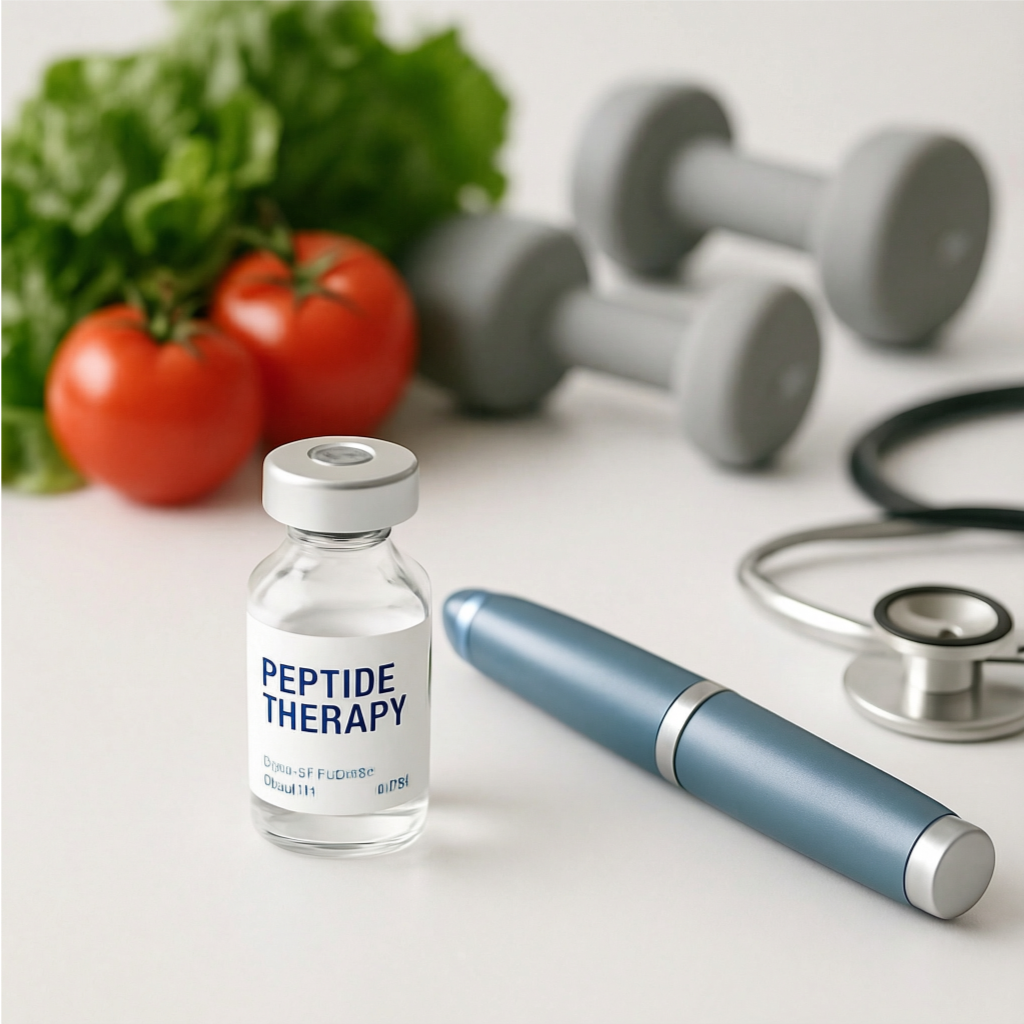How I Healed My Dog with Peptides: The Zeus Story That Changed Everything
A veterinary emergency turned into a breakthrough discovery about peptide therapy for pets

The Morning That Changed Everything
Picture this: You wake up on a peaceful Saturday morning, only to find your beloved dog has torn a two-inch hole in his leg down to the muscle and bone. That's precisely what happened to me and my dog Zeus.
It started innocently enough. Zeus had developed a hematoma on his hind leg, essentially a blood-filled bump under the skin. When it burst, he began scratching at it. At first, it seemed minor. Just a little irritation that he was worrying about.
But overnight, everything changed.
When I woke up that morning, I discovered Zeus had chewed completely through his skin, creating a gaping wound that exposed muscle and bone underneath. The sight was horrifying. My heart dropped as I watched my one-and-a-half-year-old pup in apparent agony.
The Vet's Shocking Discovery
I rushed Zeus to our veterinarian immediately. Even she was stunned by what she found during the examination.
"This is very serious," she said, her face grave as she assessed the damage. The hematoma had created a pocket beneath Zeus's skin that extended three inches in every direction from the visible wound. It was bleeding, infected-looking, and far worse than it appeared on the surface.
Her recommendation?
Emergency veterinary surgery at the animal hospital.
The cost: $4,000. The timeline: An entire weekend in intensive care.
The surgery would involve cleaning out the entire wound area to prevent sepsis and ensure proper healing. While I love Zeus and would do anything for him, I had to ask about alternatives.
Plan B: The Traditional Route
"Well," the vet said thoughtfully, "there is another option, but it's going to require serious commitment from you."
Her alternative plan involved:
- Hydrotherapy twice daily (morning and evening)
- Silver colloidal cream applications to prevent infection
- Weekly vet visits for monitoring
- 8-10 weeks of intensive care
This timeline would stretch from Thanksgiving through Christmas, a daunting prospect for both Zeus and our family.
As I drove home with the treatment supplies, my mind started racing. I'd been following the emerging research on peptide therapy for humans. Could the same regenerative compounds that were helping people heal faster also work for my dog?
The Wolverine Protocol Experiment
That night, I placed an overnight order for BPC-157 and TB-500 – two peptides known for their remarkable healing properties. The combination is sometimes called the "Wolverine Protocol" because of how dramatically it can accelerate tissue repair.
My reasoning was simple:
- Dogs have much faster metabolisms than humans
- If peptides could accelerate healing in people, they might work even better in dogs
- Zeus's youth and natural vitality could amplify the effects
I decided to start with a dose three times higher than what I would take myself, adjusted for his metabolism and body weight. Because BPC-157 dosing for dogs varies by size and condition, it’s essential to calculate dosages carefully. Our pet peptide dosage calculator helps ensure accurate measurements for veterinary peptide protocols.
The Results That Shocked Everyone
Exactly one week later, I brought Zeus back for his scheduled check-up.
The veterinarian took one look at the wound and literally shook her head in disbelief.
"Well," she said slowly, "you won't need to come back every week anymore. I have no medical reason to see you weekly; he looks like he's doing remarkably well."
In just seven days, Zeus's wound had healed more than she expected to see in several weeks.
I continued the peptide protocol twice daily for about a month. The transformation was incredible to witness:
- Week 1: Dramatic reduction in wound size and inflammation
- Week 2: Clear signs of new tissue formation
- Week 3: Wound edges pulling together naturally
- Week 4: What had been a two-inch gaping hole was now just a pencil-thin scab
By the end of the month, Zeus looked like he'd simply bumped into something and gotten a minor scratch. The deep, extensive wound was completely healed.
The Financial Reality Check
Let's talk numbers for a moment:
- Emergency surgery route: $4,000 + weekend hospitalization + weeks of aftercare
- Peptide therapy route: Approximately $700 in peptides + basic wound care
Zeus was completely healed in one month instead of the projected 8-10 weeks with traditional treatment.
An Unexpected Bonus Discovery
During a routine examination several months later, X-rays revealed that Zeus had hip dysplasia, a serious condition for such a young dog. The veterinarian immediately began discussing surgical options.
But I had a different idea.
Instead of subjecting Zeus to another major surgery, I decided to continue giving him the Wolverine peptide blend every six months as a preventive measure.
The results speak for themselves: Zeus is now in fantastic shape, and his hip dysplasia has never caused him any noticeable discomfort or mobility issues.
What This Means for Pet Owners
Zeus's story illustrates something revolutionary happening in veterinary medicine. The same regenerative therapies that are transforming human health can help our pets heal faster, more completely, and with less invasive intervention.
Key takeaways from our experience:
- Faster healing times – Weeks instead of months
- Reduced veterinary costs – Significant savings on emergency procedures
- Less trauma for pets – Avoiding major surgeries when possible
- Preventive applications – Managing chronic conditions like hip dysplasia
- Quality of life improvements – Pets maintaining mobility and comfort
The Bigger Picture
Imagine if peptide therapy became mainstream in veterinary medicine. How many pets could avoid unnecessary surgeries? How many owners could save thousands of dollars while giving their animals better outcomes?
Zeus's healing journey opened my eyes to the incredible potential of regenerative medicine for pets. While this was our personal experience, and results may vary, it's clear that we're on the cusp of a significant shift in how we approach animal healthcare.
Important Considerations
Before anyone considers peptide therapy for their pets, please note:
- This was our personal experience with one specific situation
- Always consult with a veterinarian before trying any new treatments
- Proper dosing and administration are crucial for safety
- Not all conditions may be suitable for peptide therapy
- Emergencies may still require immediate veterinary intervention
Dosing peptides for dogs requires even greater precision than human protocols. To ensure safety and accuracy, use our peptide calculator for pets, designed specifically to calculate peptide dosages based on animal weight and protocol requirements.
Zeus's story isn't just about one dog's remarkable healing; it's about the future of veterinary medicine and the incredible bond between humans and their animal companions.
Read more on the Project Biohacking Newsletter.
Have you had experiences with alternative or regenerative therapies for your pets?
About the Author: A pet owner passionate about exploring innovative health solutions for both humans and animals. When not researching the latest in peptide therapy, you can find them hiking with Zeus, who continues to thrive years after his remarkable recovery.










